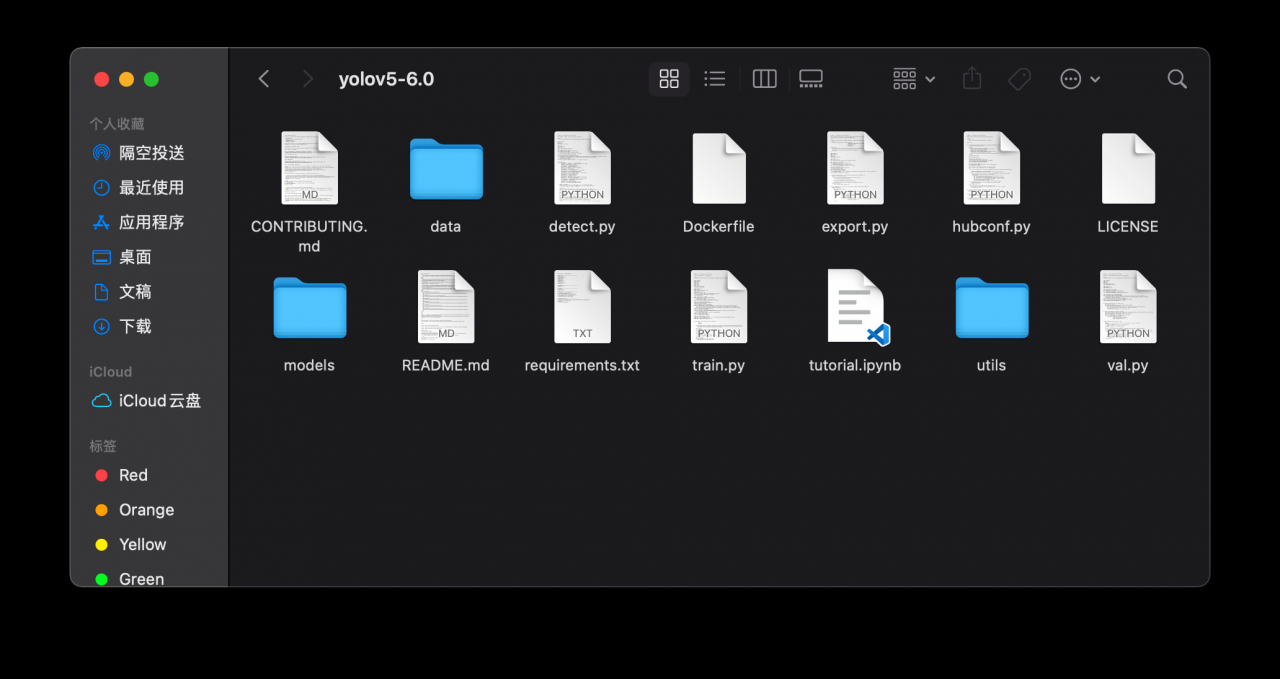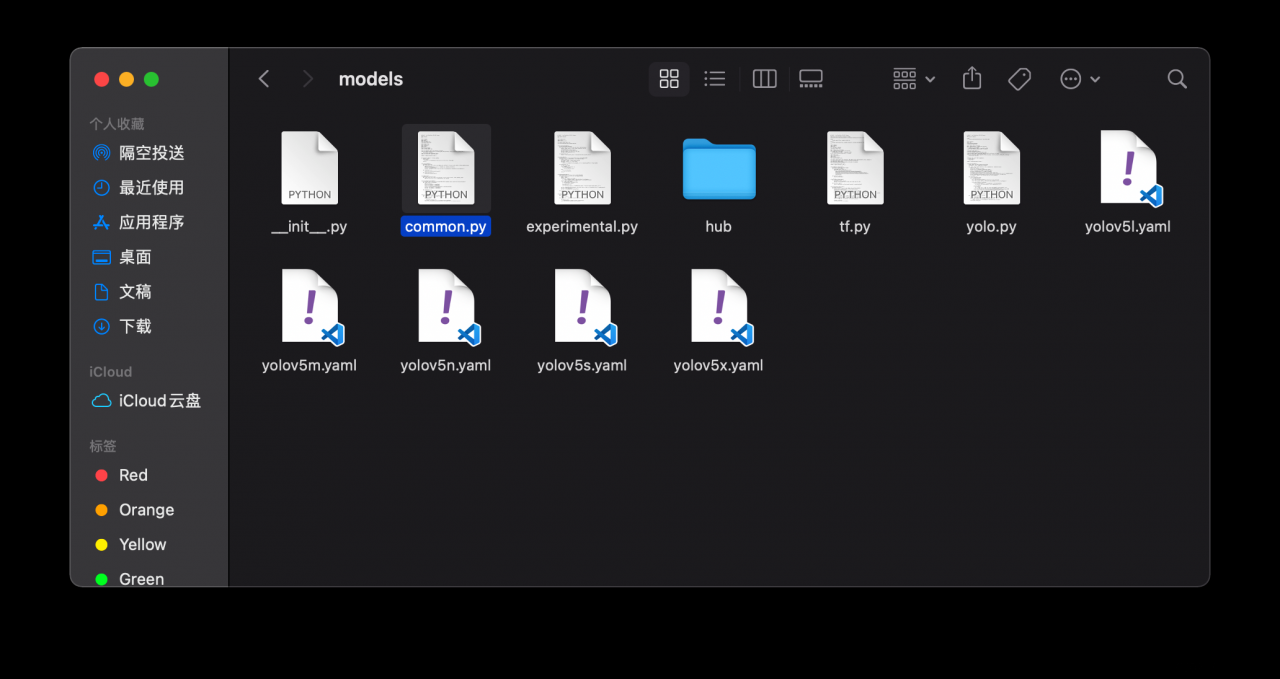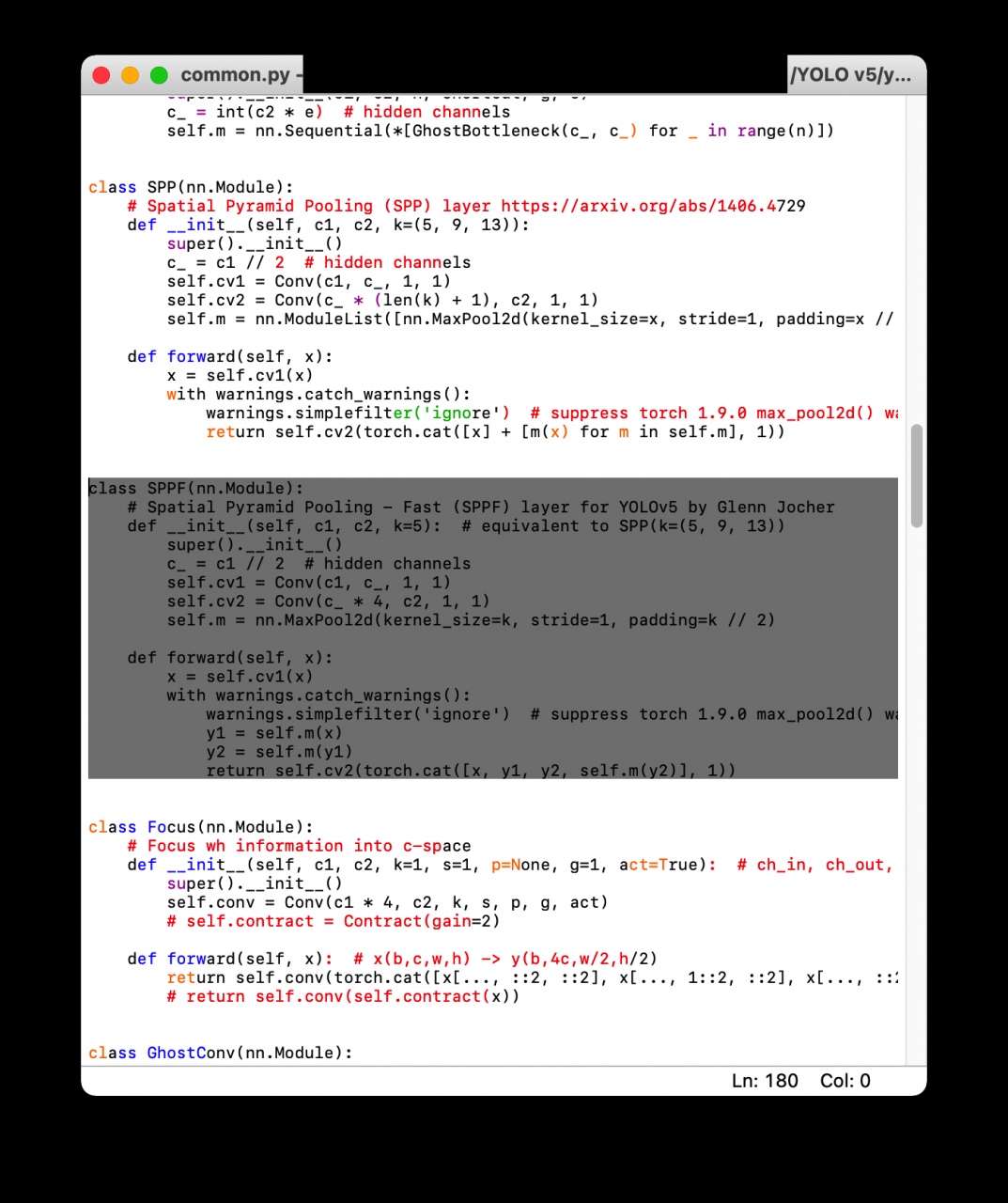Error:
CommandNotFoundError: Your shell has not been properly configured to use ‘conda activate’.
Solution:
source activate
source deactivateExecuting CONDA activate XXX again will not cause any problems
Error:
CommandNotFoundError: Your shell has not been properly configured to use ‘conda activate’.
Solution:
source activate
source deactivateExecuting CONDA activate XXX again will not cause any problems
When debugging the code of densenet for classification task, the following errors are encountered in the process of image preprocessing:
runtimeerror: stack expectations each tensor to be equal size, but got [640, 640] at entry 0 and [560, 560] at entry 2
it means that the size of the loaded sheets is inconsistent
after searching, it is found that there should be a problem in the preprocessing process when I load the image
the following is the instantiation part of training data preprocessing.
train_transform = Compose(
[
LoadImaged(keys=keys),
AddChanneld(keys=keys),
CropForegroundd(keys=keys[:-1], source_key="tumor"),
ScaleIntensityd(keys=keys[:-1]),
# # Orientationd(keys=keys[:-1], axcodes="RAI"),
Resized(keys=keys[:-1], spatial_size=(64, 64), mode='bilinear'),
ConcatItemsd(keys=keys[:-1], name="image"),
RandGaussianNoised(keys=["image"], std=0.01, prob=0.15),
RandFlipd(keys=["image"], prob=0.5), # , spatial_axis=[0, 1]
RandAffined(keys=["image"], mode='bilinear', prob=1.0, spatial_size=[64, 64], # The 3 here is because we don't know what the size of the three modal images will be after stitching, so we first use
rotate_range=(0, 0, np.pi/15), scale_range=(0.1, 0.1)),
ToTensord(keys=keys),
]
)My keys are [“t2_img”, “dwi_img”, “adc_img”, “tumor”]
the error shows that the loaded tensor has dimensions [640, 640] and [560, 560], which are the dimensions of my original image, which indicates that there may be a problem in my clipping step or resize step. Finally, after screening, it is found that there is a problem in my resize step. In the resize step, I selected keys = keys [: – 1], that is, it does not contain “tumor”. Therefore, when resizing, my tumor image will still maintain the size of the original image, and the data contained in this dictionary will still be a whole when loaded, The dimensions of each dimension of the whole will automatically expand to the largest of the corresponding dimensions of all objects, so the data I loaded will still be the size of the original drawing. Make the following corrections:
train_transform = Compose(
[
LoadImaged(keys=keys),
AddChanneld(keys=keys),
CropForegroundd(keys=keys[:-1], source_key="tumor"),
ScaleIntensityd(keys=keys[:-1]),
# # Orientationd(keys=keys[:-1], axcodes="RAI"),
Resized(keys=keys, spatial_size=(64, 64), mode='bilinear'), # remove [:-1]
ConcatItemsd(keys=keys[:-1], name="image"),
RandGaussianNoised(keys=["image"], std=0.01, prob=0.15),
RandFlipd(keys=["image"], prob=0.5), # , spatial_axis=[0, 1]
RandAffined(keys=["image"], mode='bilinear', prob=1.0, spatial_size=[64, 64], # The 3 here is because we don't know what the size of the three modal images will be after stitching, so we first use
rotate_range=(0, 0, np.pi/15), scale_range=(0.1, 0.1)),
ToTensord(keys=keys),
]
)Run successfully!
AttributeError: module ‘time’ has no attribute ‘clock’
Error Messages:
# `flask_sqlalchemy` Error:
File "D:\python38-flasky\lib\site-packages\sqlalchemy\util\compat.py", line 172, in <module>
time_func = time.clock
AttributeError: module 'time' has no attribute 'clock'reason:
Python 3.8 no longer supports time.clock, but it still contains this method when calling. There is a version problem.
Solution:
Use the replacement method: time.perf_Counter(), such as:
import time
if win32 or jython:
# time_func = time.clock
time_finc = time.perf_counter()
else:
time_func = time.timePdfplumber reports an error when reading PDF table attributeerror: function/symbol ‘arc4_stream_init’ not found in library
Solutions to errors reported
Error reporting item
When using pdfplumber to extract tables in PDF, you will be prompted that arc4 is missing_stream_init。
Traceback (most recent call last):
File "C:\Users\Stan\Python\ALIRT\pdf extracter\test.py", line 50, in <module>
text = convert_pdf_to_txt('test_pdf.pdf')
File "C:\Users\Stan\Python\ALIRT\pdf extracter\test.py", line 40, in convert_pdf_to_txt
for page in PDFPage.get_pages(fp, pagenos, maxpages=maxpages, password=password,caching=caching, check_extractable=True):
File "C:\Users\Stan\anaconda3\lib\site-packages\pdfminer\pdfpage.py", line 127, in get_pages
doc = PDFDocument(parser, password=password, caching=caching)
File "C:\Users\Stan\anaconda3\lib\site-packages\pdfminer\pdfdocument.py", line 564, in __init__
self._initialize_password(password)
File "C:\Users\Stan\anaconda3\lib\site-packages\pdfminer\pdfdocument.py", line 590, in _initialize_password
handler = factory(docid, param, password)
File "C:\Users\Stan\anaconda3\lib\site-packages\pdfminer\pdfdocument.py", line 283, in __init__
self.init()
File "C:\Users\Stan\anaconda3\lib\site-packages\pdfminer\pdfdocument.py", line 291, in init
self.init_key()
File "C:\Users\Stan\anaconda3\lib\site-packages\pdfminer\pdfdocument.py", line 304, in init_key
self.key = self.authenticate(self.password)
File "C:\Users\Stan\anaconda3\lib\site-packages\pdfminer\pdfdocument.py", line 354, in authenticate
key = self.authenticate_user_password(password)
File "C:\Users\Stan\anaconda3\lib\site-packages\pdfminer\pdfdocument.py", line 361, in authenticate_user_password
if self.verify_encryption_key(key):
File "C:\Users\Stan\anaconda3\lib\site-packages\pdfminer\pdfdocument.py", line 368, in verify_encryption_key
u = self.compute_u(key)
File "C:\Users\Stan\anaconda3\lib\site-packages\pdfminer\pdfdocument.py", line 326, in compute_u
result = ARC4.new(key).encrypt(hash.digest()) # 4
File "C:\Users\Stan\anaconda3\lib\site-packages\Crypto\Cipher\ARC4.py", line 132, in new
return ARC4Cipher(key, *args, **kwargs)
File "C:\Users\Stan\anaconda3\lib\site-packages\Crypto\Cipher\ARC4.py", line 60, in __init__
result = _raw_arc4_lib.ARC4_stream_init(c_uint8_ptr(key),
File "C:\Users\Stan\anaconda3\lib\site-packages\cffi\api.py", line 912, in __getattr__
make_accessor(name)
File "C:\Users\Stan\anaconda3\lib\site-packages\cffi\api.py", line 908, in make_accessor
accessors[name](name)
File "C:\Users\Stan\anaconda3\lib\site-packages\cffi\api.py", line 838, in accessor_function
value = backendlib.load_function(BType, name)
AttributeError: function/symbol 'ARC4_stream_init' not found in library 'C:\Users\Stan\anaconda3\lib\site-packages\Crypto\Util\..\Cipher\_ARC4.cp37-win_amd64.pyd': error 0x7fSolution:
Downgrade:
pip install pycryptodome==3.0.0Two methods
Method 1:
# Installation
$ pip install arc4
# Import ARC4 package
from arc4 import ARC4Method 2:
# Installation
$ pip install crypto
# Import ARC4 package
from Crypto.Cipher import ARC4Problem code:
MySQLdb._exceptions.ProgrammingError: (1064, "You have an error in your SQL syntax; check the manual that corresponds to you
r MySQL server version for the right syntax to use near 'read,mention) values ('家长偏心对孩子的影响有多大',15424499,5655)'
at line 1")First analyze the error message: MySQLdb._exceptions.ProgrammingError is because the connecting party did not respond correctly after a period of time or the connected host did not respond, and the connection attempt failed.
So I first checked the sql statement, and when I ran my sql statement in Navicat, I found:

Obviously, the read inside is the keyword index, and an error is reported.
Solution: change the key value in items to something else.
forrtl: error (200): program aborting due to control-C event
pycharm Error:
forrtl: error (200): program aborting due to control-C event
Image PC Routine Line Source
libifcoremd.dll 00007FFD5FCA3B58 Unknown Unknown Unknown
KERNELBASE.dll 00007FFDC015B933 Unknown Unknown Unknown
KERNEL32.DLL 00007FFDC15D7034 Unknown Unknown Unknown
ntdll.dll 00007FFDC2762651 Unknown Unknown Unknown
Solution:
pip install --upgrade scipyJust run this in terminal. The principle is not clear.
Error Messages:
RuntimeError: one of the variables needed for gradient computation has been modified by an inplace operation: [torch.FloatTensor [544, 768]], which is output 0 of ViewBackward, is at version 1; expected version 0 instead.
Hint: enable anomaly detection to find the operation that failed to compute its gradient, with torch.autograd.set_detect_anomaly(True).
Solution:
The reason for the error is that when I was building the network model, the code for summing residuals was written like this: x += y
But in pytorch, it is wrong to write it like this, just change it to: x = x+y
When running the detect.py program of yolov5, the following error prompt attributeerror appears: can’t get attribute sppf on module models. Common from D:// yolov\ yolov5-5.0\ odels\common.py**

2. Solution

class SPPF(nn.Module): # export-friendly version of nn.SiLU()
@staticmethod
def forward(x):
return x * torch.sigmoid(x)


Problem-solving:

Bitcake failed on the simplest recipe
1. Compilation error: error: execution of event handler ‘sstate’_ eventhandler2’ failed
Download the yocto code. When compiling, the following errors are reported:
$ bitbake core-image-minimal
Loading cache: 100% |##########################################################################################################| Time: 0:00:00
Loaded 1320 entries from dependency cache.
ERROR: Execution of event handler 'sstate_eventhandler2' failed
Traceback (most recent call last):
File "/home/some-user/projects/melp/poky/meta/classes/sstate.bbclass", line 1015, in sstate_eventhandler2(e=<bb.event.ReachableStamps object at 0x7fbc17f2e0f0>):
for l in lines:
> (stamp, manifest, workdir) = l.split()
if stamp not in stamps:
ValueError: not enough values to unpack (expected 3, got 1)
ERROR: Command execution failed: Traceback (most recent call last):
File "/home/some-user/projects/melp/poky/bitbake/lib/bb/command.py", line 101, in runAsyncCommand
self.cooker.updateCache()
File "/home/some-user/projects/melp/poky/bitbake/lib/bb/cooker.py", line 1658, in updateCache
bb.event.fire(event, self.databuilder.mcdata[mc])
File "/home/some-user/projects/melp/poky/bitbake/lib/bb/event.py", line 201, in fire
fire_class_handlers(event, d)
File "/home/some-user/projects/melp/poky/bitbake/lib/bb/event.py", line 124, in fire_class_handlers
execute_handler(name, handler, event, d)
File "/home/some-user/projects/melp/poky/bitbake/lib/bb/event.py", line 96, in execute_handler
ret = handler(event)
File "/home/some-user/projects/melp/poky/meta/classes/sstate.bbclass", line 1015, in sstate_eventhandler2
(stamp, manifest, workdir) = l.split()
ValueError: not enough values to unpack (expected 3, got 1)It looks like a python error. Who knows what the problem is? Am I using the wrong version?
The following is the output of Python — version
$ python --version
Python 2.7.122. How to solve it?
Delete the TMP and sstate cache directories, try again, and compile OK
[SSL: certificate_verify_failed] problem when downloading video using you get and ffmpeg
Since the you get -- debug debugging shows that it is a certificate verification problem, the part ignoring SSL certificate verification is added to the code and implemented in pycharm (non command line)
Modify url = 'website', output_Dir = R 'save path'
import ssl
from you_get import common
# Ignore certificate validation issues
ssl._create_default_https_context = ssl._create_unverified_context
# Call any_download_playlist in you_get.common to download a collection
common.any_download_playlist(url='https://www.bilibili.com/video/BVXXX',stream_id='',info_only=False,
output_dir=r'F:\StudyLesson\YouGet',merge=True)
# Call any_download in you_get.common for single set download
common.any_download(url='https://www.bilibili.com/video/BVXXX?p=8',stream_id='',
info_only=False,output_dir=r'F:\StudyLesson\YouGet',merge=True)So far, the video has been downloaded successfully
record.
This error occurred in the last step of installing mujoco.
All the previous steps have been obtained, including downloading mjkey, installing VC + + buildtools, downloading mjpro150 and the corresponding version of mujoco py. In many tutorials, it is mentioned that PIP install mujoco py = = 1.50.1.68 should be run at last, so an error appears in the title.
function
pip install -e <path>< path> Is the local mujoco py file directory. The installation was successful.
Attached:
During the first import, the compilation will be performed first, and errors may be reported, such as mujoco and mujoco_Py installed pit code farm home
The following error is reported when using tensor ` normalization

from torchvision import transforms
import numpy as np
import torchvision
import torch
data = np.random.randint(0, 255, size=12)
img = data.reshape(2,2,3)
print(img)
print("*"*100)
transform1 = transforms.Compose([
transforms.ToTensor(), # range [0, 255] -> [0.0,1.0]
transforms.Normalize(mean = (10,10,10), std = (1,1,1)),
]
)
# img = img.astype('float')
norm_img = transform1(img)
print(norm_img)
You can add this sentence. In fact, it is to set the element type. See the tips above